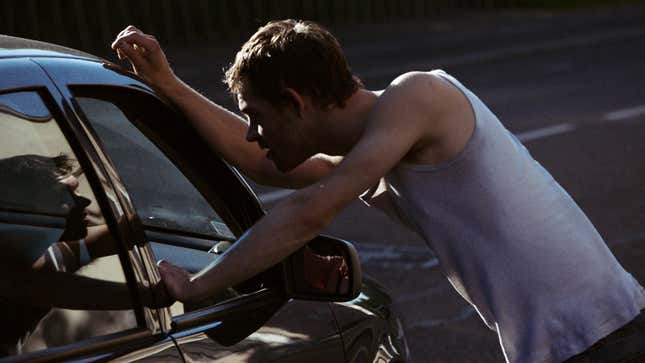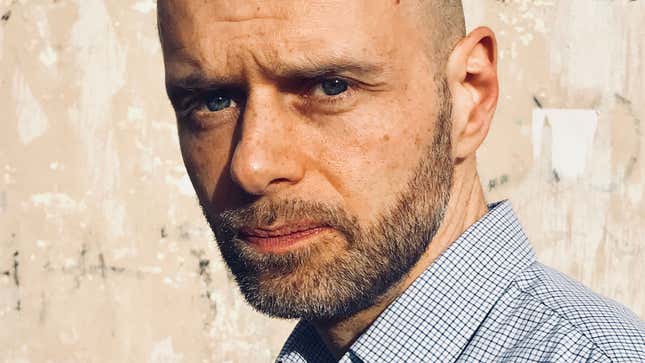Sauvage/Wild Portrays the Woes and Joys of Sex Work
Entertainment
Image: Strand Releasing
France’s Sauvage/Wild, which premiered last year at Cannes and is currently playing in select U.S. theaters, presents a challenge for its audience: Can you accept, even care about, a drug-using sex worker who has no particular interest in changing his lifestyle or job, and actually seems to enjoy aspects of it? Those who take the plunge will be rewarded by a vivid, multivalent depiction of sex work specifically (and the disconnectedness of hook-up culture generally) that derives power from its matter-of-factness. Homeless protagonist Léo (Félix Maritaud) turns tricks, sleeps in the woods, smokes crack, drinks from the gutter, and cuddles with fellow sex worker Ahd (Eric Bernard), who identifies as straight, all the while maintaining a sphinx-like affect. His addiction intensifies, but Sauvage is not a spiral, and it’s driven by staying true to Léo’s determination to choose his own life path, not its creator’s need to moralize.
Writer-director Camille Vidal-Naquet said he intentionally set out to create a “nonjudgmental” depiction of a protagonist that even he finds mysterious. “I cannot say I have him figured out totally,” he told Jezebel earlier this week at Film Forum, the theater where his movie is playing in New York. After writing his first draft, Vidal-Naquet spent time in Bois de Boulogne, a park partially located in western Paris. It’s a place known for sex work—Vidal-Naquet compared it to a supermarket, with aisles of different genders and identities, from which clients can choose. The writer-director ended up making weekly visits for the grounds for about three years. “I started bonding with them,” he said. “I felt so small in comparison.”
More than a sociological narrative about sex work, Vidal-Naquet sought to explore certain themes: the fragility of masculinity, immigration, the margins of sexuality. Despite Sauvage solely depicting man-on-man sex, often in vivid detail and with non-professional actors, Vidal-Naquet told Jezebel he doesn’t view it as an LGBTQ movie. An edited and condensed transcript of our discussion is below.
JEZEBEL: How were you able to enter the world of sex workers in France in the first place?
CAMILLE VIDAL-NAQUET: I started to write the first draft of the script, but I didn’t know what the reality of it looked like. That’s the way I write—it’s better to not know the reality because you can imagine what you want. And then when it was over, I said, “Now I’m going to adapt it to reality.” There’s a charity in France that works with homeless people. I went and met them and I said, “I have questions about my script.” They told me, “If you want real answers you have to talk to the workers.”
I went there in a little van. You open the door and you just have coffee and everybody can come and enter and just talk. I thought I would be there for one or two nights, but I ended up staying there. I started bonding with them. I felt so small in comparison. That feeling you have when you live in comfort. You complain everyday but you see how strong some people can be. I stayed a few years and then the producer said, “I’m afraid you’re never going to shoot it.” I thought everything those guys had been giving me, the trust they had been giving me, it had to be in the film.
“Sauvage/Wild can be tough, but it’s not as hard as the reality. I’m talking especially about the violence that happens between the boys.”
I’m not a sociologist, I’m not an expert, but I have the feeling that when you sell your body, you have this tendency of forgetting very quickly you are someone. You’re just something that you sell. I think it’s a mechanism of protection to say, “It’s not really me, it’s just a body, just something that’s a product that I sell.” The danger of this is you start saying you’re not very important. When you say to [one of these sex workers], “Hi, how are you?” it’s huge. It means you’re taking an interest in someone and they’re worth it, especially if you come the week after. Mostly, we talked about anything but prostitution. “How are you?” “What’s going on?” “Did you see the soccer game?” Things like that. Normal things that we do. In the beginning, I was more like a counselor, asking how was prostitution, but that wasn’t my job and I didn’t have the ability to do this. So I was just sharing a moment.
How did spending time with them change your conception of sex work?
-

-

-

-

-

-

-

-

-

-

-

-

-

-

-

-

-

-

-

-

-

-

-

-

-

-

-

-

-

-

-

-

-

-

-

-

-

-

-

-









































